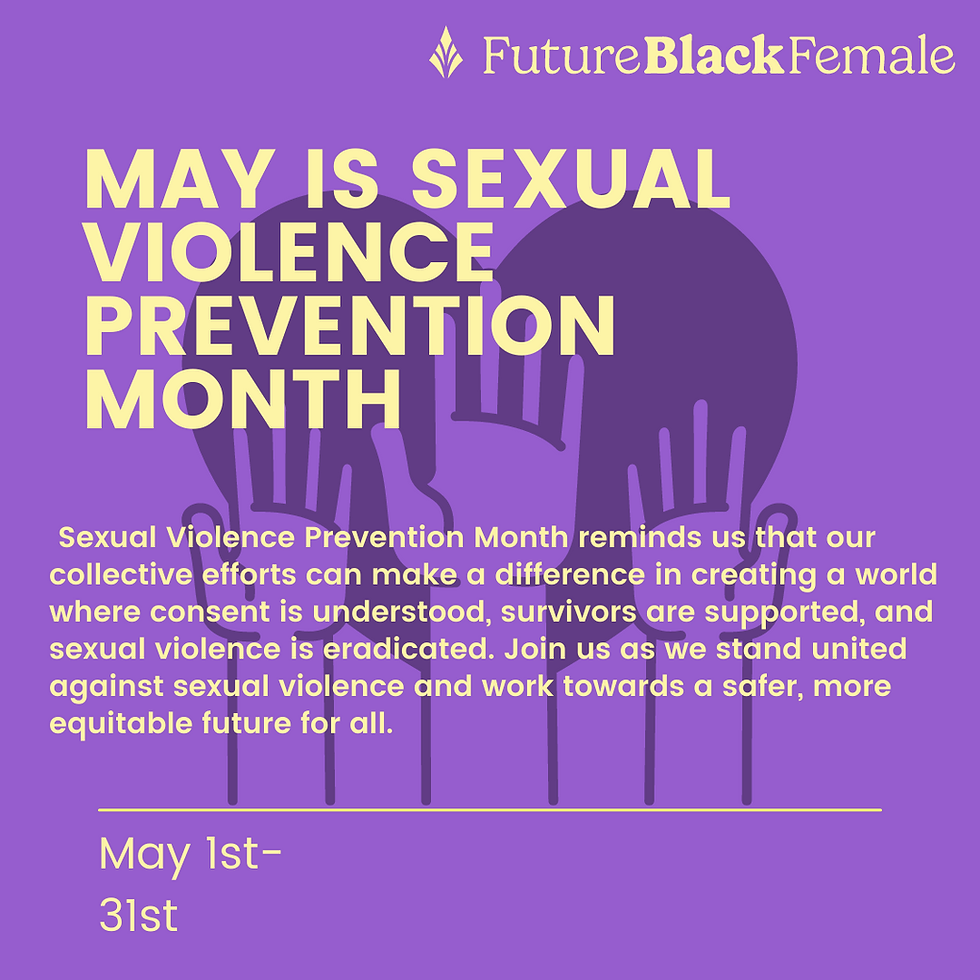We Need to Talk About Sexual Violence in Black Communities.
- social8831
- Jun 26, 2023
- 3 min read
May was the month for addressing sexual violence - its prominence in our communities; it's prevention; and the lasting effects on survivors, their families and wider communities. For an issue so widespread there must be a call to not only address it during the month of May, but throughout the year. The job isn't done until there is significant change and a major cultural shift within society around the epidemic that is sexual violence.
According to the National Sexual Violence Resource Center, sexual violence is when “someone forces or manipulates someone else into unwanted sexual activity without their consent." In Canada, one in four Black girls have been forced and/or manipulated into sexual activity. But the fact is that for every one Black woman who reports rape or sexual violence, there are 15 who don't.

Girls and women within Black communities, experience the effects of racism exacerbated by misogyny. This often happens through being over sexualized and exploited. This makes Black women 20% more likely than other groups to experience rape and sexual assault. Within Black communities, sexual violence remains unspoken, unrecognised, unacknowledged; and therefore, it continues, making it one of the most insidious forms of oppression against Black people.
According to the National Sexual Violence Resource Center, 51.01% of female survivors of rape were assaulted by an intimate partner and 40.8% were raped by an acquaintance. This means that in most cases of sexual violence, the survivors know their attackers. In society generally, but more so in Black communities, Black females are heavily sexualized from a very young age and are often blamed for acts of sexual violence perpatrated against them. In many Black communities, statutory rape is not recognized as rape, but as a consequence of a badly behaved girl. Girls are often shamed, blamed and even attacked when they speak about their experience of sexual assault.
In cases where Black females are sexually harassed by a family member, they are left unprotected and feeling unsafe in their homes. The very people who are meant to ensure their safety and protect them either actively sexually assault them or blame and shame them for being sexually traumatized. If Black females are not able to feel safe in their homes or among their family members, where can they feel safe? We have to do a better job as a community when it comes to protecting our Black females.
We need effective strategies and responses to sexual violence in Black families and communities. One way to combat sexual violence would be to provide Black females with the education they need to set up healthy boundaries as a way of protecting themselves, while also creating a safe space for them to ask questions concerning sexual health and violence. While prevention is important, it is also important for us to provide resources for survivors that can assist with the healing process.

(East Preston Daycare)
Another really important aspect often neglected by society is the education of Black boys and men on sexual violence. It is common knowledge that sexual violence is a form of GBV(Gender-Based Violence). Men and boys have a very important role to play in the prevention of sexual violence. They need to be better allies to women and girls, by educating themselves on consent and sexual violence. As allies to Black girls and women Black boys and man are able to recognize and call out their friends or acquaintances that display disrespectful or dangerous behaviour towards Black females or have a history of sexual violence. They will not turn a blind eye to protect abusers and rapists in their circles.
The impact of sexual violence is life threatening and lifelong. The journey to healing and eradicating sexual violence in our communities is not linear, thats why its important to listen to survivors and meet their needs. Here at Future Black Female, we offer Pro-Black mental health services for survivors. Other resources include the Ontario Coalition of Rape Crisis which has an Ontario-wide service for survivors of sexual violence. The journey to healing and eradicating sexual violence in our communities is not linear, thats why its important to listen to survivors and meet their needs.




Comments